10 day guided trek in the Ferlo area, Senegal

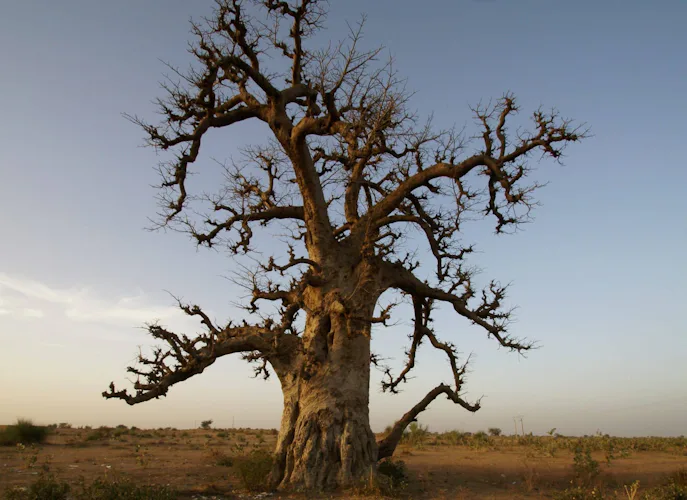
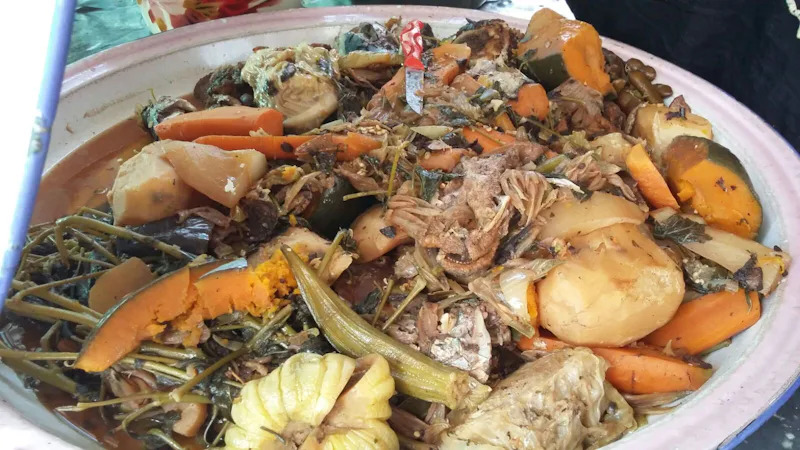
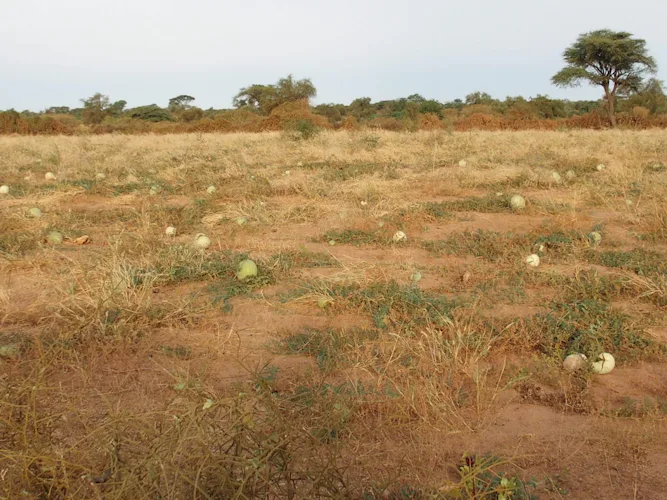
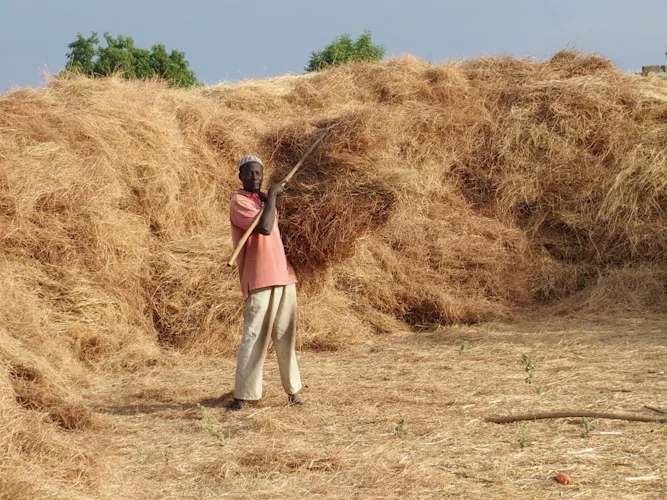
A unique hiking trip to experience the nomadic way of life of the Fulani people in the Ferlo area in Senegal. Sylvain, an ASAM guide that has lived in Senegal for many years, takes you on this unforgettable journey in Africa.
10 Days
Jan - Apr, Nov, Dec
Intermediate
Intermediate
Description
I invite you to join me on a unique journey in Senegal: for 10 days we will live as nomads, exploring the western steppes of the Ferlo region, one of the last large accesible and pastoral areas in the country. I will take you to discover a typically Sahelian cultural and ecological environment, on an authentic experience of a lifetime.
Ferlo is often referred to as a desert, a large dry area without water. And yet, for hundreds of years, people have lived there and adapted their existence to these delicate conditions. The adaptation seems simple: families and animals move according to the laws of seasons and nature. However, this nomadic life is actually the only way for them to survive.
We will go up the valley of the Ferlo, from Linguère to Keur momar sarr. The Ferlo steppe is large piece of land that represents a third of the Senegal’s territory. This trip is suitable for experienced hikers, with previous experience camping at rustic bivouacs. You can check the day-by-day itinerary below.
This incredible journey will give us the opportunity to immerse ourselves in the local culture. I will guide your steps and your spirit will be free to open to this world. This trip is a real adventure, a unique possibility to discover a new universe, completely different from our familiar world.
The hardness of the hike is related to the heat, fatigue management and the sandy nature of the soil. A car accompanies us all the way to ensure the organization of the camp and for a return to the urban centers in case of an emergency.
The hikes are scheduled to start in the morning, until 1 or 2 pm. It will be an average of 6 hours of walking time and about 20 km per day. In the afternoon we will have time to rest and/or explore the local culture or to join naturalistic activities as botany and ornithology. During the hikes or during our time in the bivouac, we will also share our knowledge on the nature and culture of this very special place in Africa.
I am a mountain guide and naturopath-herbalist and I have worked for 10 years in the Sahelian territory as an environmental specialist. I worked in the Senegalese Ferlo as head of NGOs in the context of a climate change project adaptation in the sylvo-pastoral zone of Ferlo. I will be your guide during the hikes, sharing my knowledge on environmental topics and naturalistic activities. I will also be your health advisor.
Ibrahima Ndiaye, our local guide, is from Louga. He was the accountant and logistician at the NGO where I worked at in Senegal. He knows the Ferlo area and its inhabitants well. He will be our referent for contact with local inhabitant and cultures**. Sidi was the driver of the NGO’s missions in Ferlo**. Also a mechanic, he will will be in charge of driving the 4 x 4 vehicle during the trip. Diasse is a Guinean who has lived in Louga for more than 20 years and has worked in the big hotels of Casamance. He is our cook and our joker in the bivouac.
We will take you on an unforgettable adventure through the Ferlo territory. There are 3 dominant ethnic groups in Ferlo: the Peul or Fulani, the Ouolof (Sud Ferlo) and the Moors. The Fulani are the first farmers in the area and constitute the bulk of the population. Several socio-economic activities are carried out in this zone: breeding, cereal crops farming and exploitation of pastoral resources.
Traditionally transhumant, the pastoral communities are settling more and more with the setting up of boreholes around which villages or hamlets are organized. However, transhumance remains a practice adapted to the ecological conditions of Ferlo.
If you want to join me on this authentic experience in Senegal and experience the nomadic way of life, just send me a request. Book your trip and get ready for a once-in-a-lifetime-adventure in Africa!
You can have a look at my profile and check other great hiking trips that I also guide in Greece, Italy, France and Switzerland.
Price includes
- Accommodation included
- Guiding fee
- Breakfast
- Lunch
- Dinner
- Transport during the trip
Price details
The price does not include visa if necessary, personal expenses and drinks, travel insurance and the lunch of the last day.
Itinerary
Day 1: Arrival - Dakar
Arrival to Dakar. In case of evening or night flight, transfer and night in an inn.
Day 2: Dakar-Louga-Linguère
Departure to Louga (180 km). The trip allows us to get acquainted with the landscapes of northern Senegal. After Thiès, we go through Tivaouane, the capital of Tijanes, then to the Louga region by Kebemer and Louga.
We settle in at Ibrahima Ndiaye’s compound. He will be our local guide. Presentation of the Ndiaye family, and traditional meal. The first baobabs and the Ndiaye family will welcome us warmly according to the customs of the Senegalese teranga.We will spend this first night at a camp in his compound.
Departure to the city of Linguère. the city that will be the starting point for our trek (130 km). Night in an inn at Linguere.
Day 3: Linguère - Ndiakaté
The first stage brings us quickly into the Ferlo bush. We go up a track towards Doundodji, our first stopover. We resume the march to reach our camp near the village of Ndiakaté. The first stage crosses a relatively populated area of Ferlo, with field crops and pastoral plains. The crops are mainly bissap, cowpea and watermelon. This first day is a discovery of the steppe. We will introduce the most familiar trees, including the unmissable Acacia tortilis with a typical shape, according to our perception of the savannah.
.
Day 4: Ndiakate - Yang-Yang
Step by step, we advance in the steppe and its immensity. Walking through pastel colored dry landscape, we cross our first herds of zebu and their shepherds, surely intrigued to see a band of happy hikers turning red. Yang-Yang is a village on the edge of a phosphate mine. We will go to see the borehole where the animals and men drink.
Day 5: Yang Yang - Mboula
Our final step in the pastures will take us to see the Balanites aegyptiaca, the desert date palm, an indicator of its level of drought resistance. Its oil is used for cooking or skin diseases. We will set up our bivouac on dunes to admire a sunset on the beginning of the large valley of Ferlo to Lake Guiers.
Day 6: Mboula - Nege
After three days of walking in the arid steppes and the heat of Ferlo, this stage will be refreshing and invigorating. We will follow the lake and we will have the joy to observe a well known fact, but well illustrated in these latitudes: water is life. After the austerity of the steppe, we return to animal civilization. We will see lapwing, herons, raptors, ducks, granivores, insectivores, a ballet of feathers. Lake Guiers is considered a very special spot in ornithology. It is part of the vast complex of wetlands in northern Senegal and it has the third bird sanctuary in the world: the Djoudj Park. The camp at Négué will be at the compound of the village chief where we will be his guests. It will be a great opportunity to meet the Wolof inhabitants of Ferlo and maybe (depending on the season) appreciate the thirst-quenching watermelon.
Day 15: Negee - Serinké
We will step in the world of the Fulani and cattle. At the edge of the lake, the air is magic but it is left to the hundreds of zebus that drink on each bank. It’s the day of the cattle. We will pass in the midst of nonchalant zebus, drunk with this material so rare in arid environments: water. We will arrive at an edge of Tamaris which will sound the death knell of our march to the freshness of the water. We will try to observe the rare monitor lizards. This area is the wildest of the trek. Drilling no longer exists. The edge of the river is surrounded by a dense forest of acacia and Balanites. We will walk to a Peul camp and spend the night in the camp. A unique opportunity to discover a different culture and the pleasure to share these intimate moments.
Day 8: Serinké - Gueil Gotty
We stay in the area of the Fulani by passing the valley by the plain. Some transverse valleys disturb the flatness of the landscape. We will walk on a 90-degree axis of the zebus which instinctively move towards the water. The tracks are tortuous and each brings us to camps emptied of the lively forces parties in winter transhumance. The night at Gueil Gotty is the last one, so we will watch the stars, listen to the melody of the evening and dawn in the Sahelian bush and feel the heat that escapes to give way to the nocturnal sweetness.
Day 9: Gotty Gorge - Keur momar sarr
Ultimate stage of walking. Relief to find our safety and comfort, nostalgia for these starry nights and pastoral landscapes. The first carbon machines, the first bitumen, the first telephone poles bring us back to civilization. Everyone of us will meditate on these last efforts on the Ferlo region and will record their feelings in a special corner of their memory. The car is waiting for us and we will go to Louga to the guide’s house. The family will be waiting for us and we will celebrate our victory with a festive Tiep.
Day 10: Visit and return to Dakar Airport
A day without a walk. The day is dedicated to relaxation and tourism. Everyone will have the opportunity to stay with the family or follow the program. We are planning a visit to an agro-ecological center where we can buy local handicrafts. In the afternoon we will have the opportunity to visit the old colonial city of Saint Louis, listed as a UNESCO World Heritage Site and nicknamed “the African Venice”. Here we can go for a stroll on fine beaches sipping a glass in Zébrabar, a real ecological haven in the middle of crabs, pelicans and palms. In the evening we will return to Louga to collect luggage, greet and kiss and head to the airport.
Details
More info
-FOOD The food is made on site and will be exclusively composed of local dishes. Mafé, thiep, and chicken yassa will be in the spotlight. For water, it is better to treat water with Micropur or Aquatabs. For non-trekking meals, bottled water is provided. Special diets will be taken into account on the condition you warn us before the trip.
-TRANSPORTATION assistance is provided during the entire stay. Depending on the size of the group. we will have a 4 × 4 vehicle or in a minibus with capacity from 4 to 10 passengers plus luggage. Travel to Africa is often longer and difficult. Road conditions and heat can make transfers tiring. It is necessary to consider that local realities are an integral part of the journey. Patience is a key virtue of great travelers.
-CLOTHES It is recommended to wear loose, light, breathable and covering clothes (long-sleeved) instead of wearing suncream of questionable efficacy under tropical UV. -Breathable lightweight trekking pant -Microfleece thin fleece jacket or strech for the evening -Breathable long-sleeved t-shirt or shirts -Socks for walking -Low hiking shoe adapted to sandy conditions. Absolutely avoid new shoes. -A pair of light shoes like sandals.
EQUIPMENT -A sheet and a comfort sleeping bag (10 ° C). Nights are cool in December and January. -A mosquito tent and a mattress (if necessary can be bought locally on request) -Thermo or gourde(2L) -Sunglasses with high filtration lenses, sun protection cream (contact me to get the recipe of a handmade sunscreen) and moisturizing lip stick. -Multi-purpose knife (to be placed at the time of air travel in your hold baggage like any other object that could hurt) -Light walking sticks -Simplified first aid kit with specific medicines for everyone -Binoculars and magnifying glasses -Notebook if necessary -A flashlight with batteries (or better led headlamp) -An envelope or small wallet (for tip) -Pair of spare shoe laces (and this can be useful for many other things) -Portable + "light" camera + covers or some plastic bags to wrap your camera and protect it from dust and water -Cap or hat -Travel pouch (box)
LUGGAGE -A soft and sturdy backpack (60 l on average) or a non-rigid travel bag. It is absolutely necessary to ban rigid suitcases or bags of travel, which are not adapted at all for this type of stay. -A small day-backpack of less than 30 liters that will prove very useful during the trip as hand luggage and during the hike to put everything you need during the day.
HEALTH-VACCINES -No vaccine is required for Senegal. It is advisable to consult your doctor. Malaria treatment: Anopheles mosquito transmitting the malaria virus is mainly active at night. The best prevention against malaria is to avoid being stung. The use of repellents and the wearing of long clothes are therefore recommended and it is imperative to sleep under mosquito net. But you can also take anti-malarial treatment by asking your doctor for advice. For information, malaria is present all the year in Senegal, including in Dakar but it is more rare in the dry season especially in North Senegal. As a naturopath and traveler in the tropics, I can make preventive recommendations for your stay. You can contact me if necessary.
Meeting point
FAQs
What are some recommended accommodations near our adventure location?
About the guide
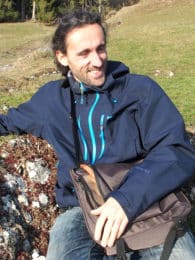
Sylvain
Mountain Guide
Passionate about botany and ornithology, trained in ecology, I have long worked in environmental protection, rural development and adaptation to climate change in the Sahel.
Coming from a family of (small) farmers in the West of France, my initial training focused on the management and protection of nature. My associative activities have also allowed me to develop a solid naturalistic culture.
My professional career began with a regional development project in the Alpes de Haute-Provence. Afterwards, I was an ornithological animator in the Eastern Pyrenees. At 25, I went to Niger and worked there for 7 years, first as an international volunteer (France volunteers) then as a technical advisor for the German cooperation services (DED/GIZ). After a brief return to France and a visit to Canada to perfect my English, I went back to West Africa - this time to Senegal where I coordinated a climate change adaptation project for a French NGO.
Tired of the contradictions of the associative and institutional milieu, I finally chose to fly on my own while keeping a privileged link with nature. While my stays in so-called "developing" countries have led me to grasp the fragility of life, it is quite naturally that I wanted to take a closer interest in health.
I then trained in naturopathy with the Herbothèque (Quebec) and the Mandorle School (Switzerland), and specialized in scientific aromatherapy with Dominique Baudoux. I also returned to my first loves: botany and the study of plants. Settled in Switzerland since September 2015, I also trained as a mountain leader at the Saint Jean d'Anniviers school in Valais. I opened my naturopathic practice in Neuchâtel in the summer of 2016 and am a member of the Syndicat des professionnels de la naturopathie (SPN) and the central committee of the Association suisse des accompagnateurs en montagne (ASAM).
Two caps - naturopath and herbalist and hiking guide - for the same passion: nature. My vocation today is to share and transmit it in many ways.
I propose "nature and health" or "nature and culture" stays, cooking-nutrition courses, herbal walks, botanical walks. It's about walking, discovering a region, its nature, learning about wild plants, who they are, what they do. A complete naturopathic check-up can be integrated into the program. This allows individuals to have a complete view of their health status and to obtain an individualized health optimization program.
The proposed destinations are regions to which I am strongly attached and/or that I know well for having lived there: the Mediterranean basin, West Africa, South-West and West France, Switzerland :
France: the Languedoc Roussillon Mediterranean and its causses, the eastern Pyrenees, the Grenoble region with the Chartreuse and Vercors, the Charente Maritime, Brittany, the Southern Alps.
Southern Italy, Naples region.
Greece: Cyclades and Parnitha Natural Park
Sahelian Africa: Northern Senegal, Niger, Burkina Faso.
Morocco: from Essaouira to the South of the Atlas Mountains
Switzerland: Vaud, Neuchâtel and Bernese Jura, pre-Alpes, Valais.
The stays take place either from a fixed point in a gîte, or while roaming. In both cases, healthy local cuisine will be at the party.
Any reservation of my stays abroad for my Swiss clientele is made through the travel agency "Le goût du voyage". This partnership is based on mutual trust and a shared travel ethic. The organization of the pre-trip is thus delegated to competent and experienced professionals, which allows me to concentrate on my work as a guide and to secure this activity on the legal level.
Other tailor-made offers can also be proposed. Feel free to contact me.
The past and present programming of my health hiking activity can be found on the "Events" page.
A blog also presents articles on hikes or stays proposed to inspire you (choose the "hiking trips" category).
Languages
French | English
Certificates
ASAM
What people are saying about Explore-Share
Kumari
5.00
I’m extremely happy with the ease with which I could book via your site reliable and experienced guide. Thank you so very much, and I’ve started to recommend your site to my friends. Dimitris is not only an awesome guide, but a wonderful person who was always looking out to give me the best experience I can have when he found out how much I love climbing! He is the Best!
Niklas
5.00
I am very pleased with Explore-Share! This was my first international climb, and the communication and response time were great. Herbie is a very skilled guide and very efficient. The entire booking process & payment was smooth. I will definitely use Explore-Share again. Thank you.
Greg
5.00
I was looking for a local guide for a hike I was planning and came across Explore-Share. They seemed to have good reviews and so decided to give them a try. The experience was very positive and completely happy with their service. I will be using them again for next trip.
Colin
5.00
Easy to set up and find the perfect trip. Informative site that is easy to use. Guides are all great to work with and communicate all arrangements needed. As simple as can be!
Lesley
4.00
Thank you explore-share for a wonderful via feratta experience. We have been wanting to learn for a long time but don't have the facilities in Scotland. The guide Mitja was extremely helpful and knowledgeable, answering all my many questions and providing advice. On the day head to take another group but he quickly arranged another guide Borut, who was brilliant. We had a fantastic morning learning via ferrata at Hvadnik in the gorge. It gave us the confidence to later hire our own equipment and go out in Mojstrana. Altogether a five star + experience. Thank you.
Find more trips in Senegal
Join our newsletter!
Stay up-to-date on the best adventures.